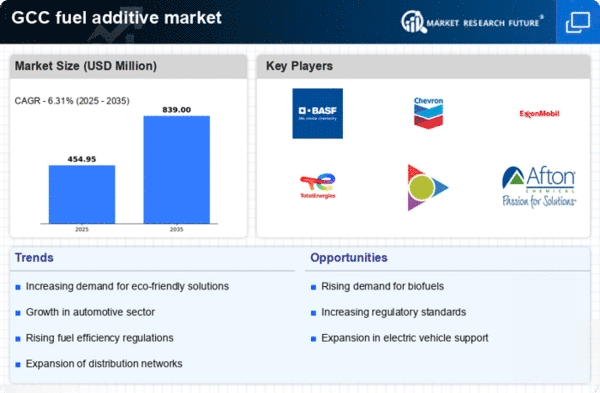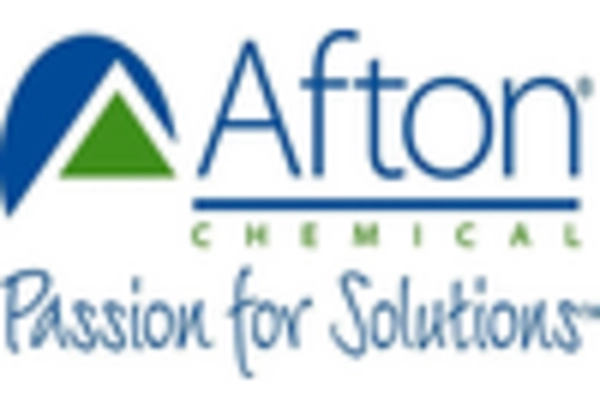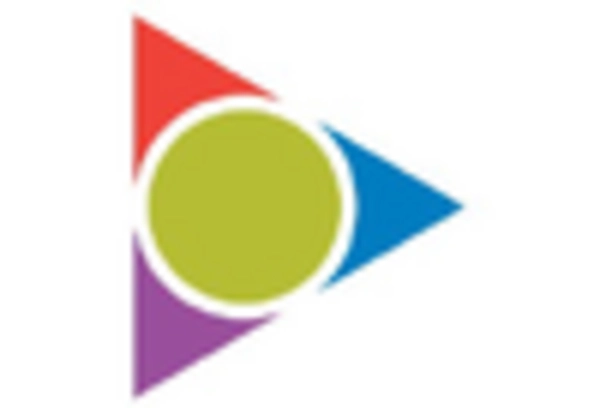Focus on Emission Reduction
significantly influenced by the increasing focus on emission reduction in the GCC region. Governments are implementing stricter regulations aimed at minimizing vehicular emissions, which has led to a heightened demand for additives that can help meet these standards. Fuel additives that improve combustion efficiency and reduce harmful emissions are becoming essential for compliance with environmental regulations. The market for such additives is projected to grow, with estimates indicating a potential increase of 8% in the next few years. This regulatory landscape is likely to encourage innovation within the fuel additive market, as companies strive to develop products that not only enhance performance but also align with sustainability goals.
Rising Vehicle Ownership Rates
poised for growth due to the rising vehicle ownership rates in the GCC region. As urbanization accelerates and disposable incomes increase, more individuals are purchasing vehicles, leading to higher fuel consumption. This trend creates a larger customer base for fuel additives, as vehicle owners seek to optimize their fuel usage and maintain engine health. The GCC countries have witnessed a steady increase in vehicle registrations, with estimates suggesting a growth rate of around 5% annually. Consequently, the demand for fuel additives that enhance performance and reduce emissions is likely to rise, further propelling the fuel additive market forward. Manufacturers are expected to capitalize on this trend by offering tailored solutions that cater to the specific needs of the growing vehicle population.
Consumer Awareness and Education
experiencing a shift driven by increasing consumer awareness and education regarding the benefits of fuel additives. As consumers become more informed about the advantages of using additives, such as improved engine performance and reduced emissions, the demand for these products is likely to rise. Educational campaigns and marketing efforts by manufacturers are playing a pivotal role in informing consumers about the potential benefits of fuel additives. In the GCC region, where fuel quality and engine maintenance are critical concerns, this heightened awareness is expected to contribute to a growth rate of around 5% in the fuel additive market. As consumers seek to optimize their fuel usage and prolong the life of their vehicles, the market for fuel additives is likely to expand.
Increasing Fuel Efficiency Demand
The fuel additive market is experiencing a notable surge in demand for products that enhance fuel efficiency. As consumers and businesses alike seek to reduce fuel consumption and associated costs, the market for fuel additives that improve engine performance and efficiency is expanding. In the GCC region, where fuel prices can significantly impact operational costs, the adoption of fuel additives that promise better mileage is becoming increasingly prevalent. Reports indicate that the fuel efficiency-enhancing additives segment is projected to grow at a CAGR of approximately 6% over the next five years. This trend is likely to drive innovation within the fuel additive market, as manufacturers strive to develop more effective formulations that meet the evolving needs of consumers and regulatory standards.
Technological Innovations in Additive Formulations
benefiting from ongoing technological innovations in additive formulations. Advances in chemical engineering and materials science are enabling the development of more effective and efficient fuel additives. These innovations are crucial for enhancing fuel performance, improving engine cleanliness, and reducing wear and tear. In the GCC region, where high temperatures can affect fuel stability, the demand for advanced formulations that can withstand extreme conditions is increasing. The market is expected to see a growth rate of approximately 7% as manufacturers invest in research and development to create cutting-edge products. This focus on innovation is likely to reshape the competitive landscape of the fuel additive market, as companies that can deliver superior performance gain a competitive edge.

















